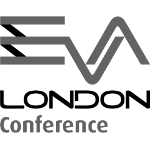EVA London 2020
The 30th anniversary EVA London 2020 conference was due place from 6th–9th July 2020. However due to the pandemic, we delayed the conference until Monday 16th November – Thursday 19th November 2020, with workshops on Friday 20th November 2020. The conference was\completely online. See especially programme and registration information. At EVA London conferences, we aim to bring together artists, designers, researchers, technologists, to discuss electronic visualisation technologies in art, design, music, dance, theatre, the sciences and more. Many recorded online talks are available.
EVA London 2020 was due be held at the new BCS London office, a central London venue in the City of London, but this is closed until at least the start of 2021 due to the pandemic, so the conference was held online. 2020 is the 30th anniversary of EVA London so we commemorated this during the conference. However, given the Covid-19 crisis, we also plan to extend the celebration to EVA London 2021.
The EVA London 2020 proceedings are available as follows:
J. Weinel, J.P. Bowen, G. Diprose, and N. Lambert (eds.) EVA London 2020: Electronic Visualisation & the Arts. Proceedings of a conference to be held online in November. BCS, The Chartered Institute for IT, 2020. ISBN 978-1-78017-538-6.
Papers online. Published online via ScienceOpen by the BCS: The Chartered Institute for IT, in the series: Electronic Workshops in Computing (eWiC) Electronic Visualisation and the Arts (EVA 2020). DOI 10.14236/ewic/EVA2020.0 – see also DBLP access.
Presentations were recorded on YouTube. See EVA London 2020 on the EVA Archive, part of the Computer Arts Archive for convenient links to presentations and papers.
For EVA London 2020 Conference information, see:
- Programme
- Organising Committee
- Key Dates
- Recordings of Talks
- Proceedings
- Venue, Location, Accommodation (originally planned in London)
- Call for Proposals (now closed)
- Registration (now closed)
See also:
The Call for Proposals was issued on Wednesday 30th October 2019. The deadline for proposal abstracts was on Monday 13th January 2020. An open access online proceedings and a printed proceedings are available.
Conference themes
EVA London’s Conference themes include the use of new and emerging technologies in the following areas (to be broadly interpreted), and a focus on “AI and the Arts: Artificial Imagination”:
- Digital Art
- Data, Scientific and Creative Visualisation
- Digitally Enhanced Reality and Everyware
- 2D and 3D Imaging, Display and Printing
- Mobile Applications
- Museums and Collections
- Music, Performing arts, and Technologies
- Open Source and Technologies
- Preservation of Digital Visual Culture
- Virtual Cultural Heritage
- Ethics in Digital Art
- Digital Art Histories
- Artificial Intelligence
